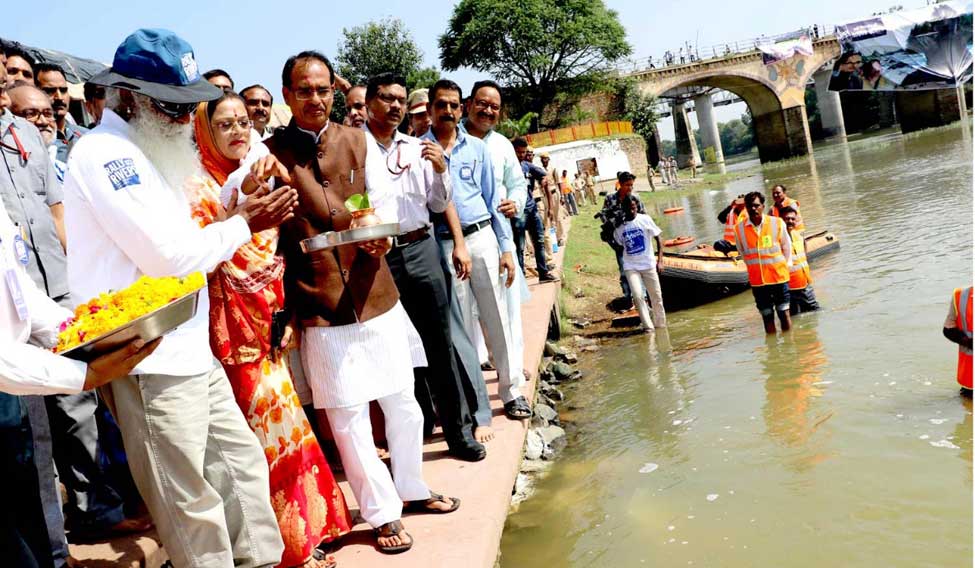With Madhya Pradesh and Uttar Pradesh governments going back on the MoU signed between the two states in 2005, a new agreement will be signed after the two states raising various objections.
The first phase of Rs 16,000 crore Ken-Betwa Rivel Linking Project (KBRL) had hit a road block after Uttar Pradesh demanded expansion of irrigation area while Madhya Pradesh asked for inclusion of Kotha Barrage, Bina Complex and Lower Orr Dam in the first phase.
With the objections coming from both sides and cost escalating due to new proposals of state, it had become mandatory to sign a new memorandum and start the scheme afresh. The environmental clearance has already been acquired, a source in Madhya Pradesh government said.
Earlier Union Water Resources Minister Uma Bharti was relived of the charge of the ministry after allegations of delay in the project. Later Nitin Gadkari, the new minister, had announced that first phase of the project will begin by the year end. However, with the demands of states, the water resource ministry is reworking the proposal for extra funding from the finance ministry. The project is being financed by Union and state governments in the ratio of 90:10. In the new proposal the first and second will be clubbed to accommodate the demands of two states.
A major opposition for the KBRL was from the people of Panna in Bundelkhand who objected to the dam being made by submerging the land of tiger reserve. The 230-km long Ken-Betwa river linking (KBRL) has been mired in controversy from the very beginning. Previous water resources minister Uma Bharti was unable to find out an amicable solution even after an ultimatum given by the Prime Minister Office.
The concrete canal project was supposed to irrigate the parched land of Bundelkhand. According to original agreement singed in 2004 between then Madhya Pradesh chief minister Babulal Gour and then UP chief minister Mulyam Singh, Uttar Pradesh would get 1,700 million cusec of water. However, now Shivraj Singh says that UP should get only 700 million cusec of water as Madhya Pradesh is “sacrificing a lot”. His argument is that the 543 sq km Panna National Park is getting submerged in the project dam while thousands of MP farmers will be displaced due to canal. However after 13 years of the agreement Uttar Pradesh, too, wants a bigger share of 2,200 million cusec water against its share of 1,700.
The first of its kind river linking project at an estimated cost of Rs 18,000 was initiated in 2005 by the then UPA government. It was conceptualised by its predecessor NDA government led by Atal Bihari Vajpayee. An agreement between Madhya Pradesh and Uttar Pradesh was signed in August 2005.
The KBRL is a part of ambitious project of Government of India to link the 14 Himalayan and 16 peninsular rivers by 30 canals and 3,000 reservoirs to irrigate 87 million hectares of parched land in various parts of the country.
The project is supposed to irrigate 6.35 lakh hectares in six of parched Bundelkhand region. Some 78 megawatts of power will also be produced from the project. Technically the Ken-Betwa link project is to divert the surplus waters of Ken basin to water deficit Betwa basin.
The dam is vehemently being opposed by the people of Panna where 90 square km of land including 61 sq km of core tiger habitat in the 543 sq km Panna Tiger Reserve will be submerged. An estimated 2.3 million trees have to be felled when the project is completed. The environmental clearance to the project was being opposed by forest authorities. Panna Tiger Reserve has been in news for a few years back when most of the tigers died in the protected areas like Sariska sanctuary in Rajasthan.
Chhatarpur, Tikamgarh (home district of Uma Bharti and Mahoba) Jhansi and Banda districts of Uttar Pradesh will get water for irrigation and drinking. Approximately, 14 lakh people in the region will be directly benefitted. A huge 73 metre earthen dam on river Ken in Panna will facilitate water in the canal to join with Betwa river near Jhansi (Lok Sabha constituency of Uma Bharti).
According to the government sources, the only solution to recurring droughts in Bundelkhand is to link the two rivers in Madhya Pradesh and divert water to Mahoba, Banda and Jhansi of Uttar Pradesh through canals.






